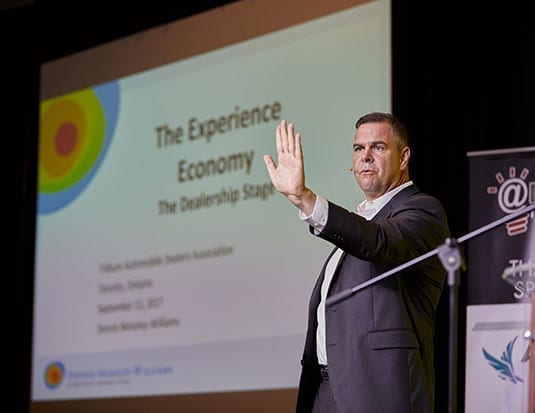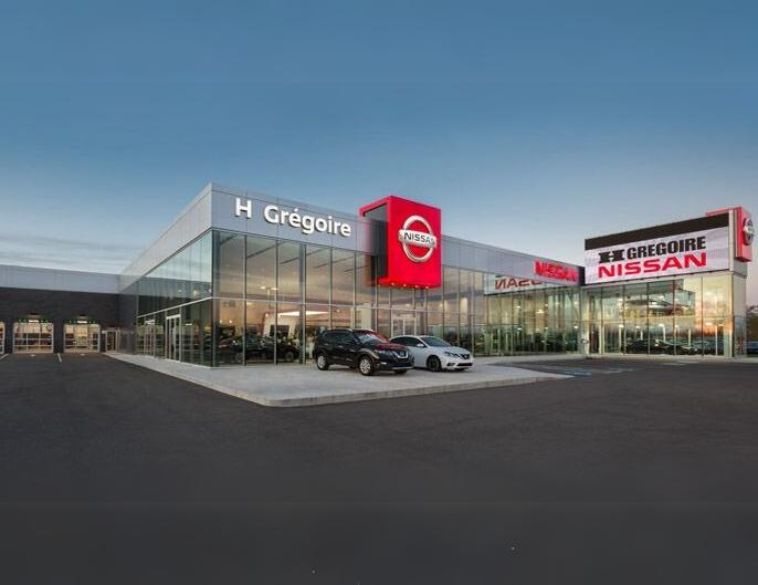It’s time to stop selling goods and services.
If you weren’t able to make it to our latest Auto Dealers Innovation Series, which took place in Ottawa and Toronto in September, you missed out on an incredible presentation by Dennis Moseley-Williams, Founder of Dennis Moseley-Williams Strategic Consulting.
The topic of his presentation was “The Experience Economy,” and Dennis explained why it’s necessary for all businesses, including dealers, to look beyond selling goods and services. Instead, we need to sell an experience.
He kicked off his presentation with a great story about his haircut, and how he’s been getting his hair cut at the same no-frills barber for years. Then, one day, he was introduced to a more upscale salon where he was treated like a king, offered a coffee, and taken through the process feeling like a million bucks.
In the end, his hair looked the same as when he had it cut by the no-frills barber, but the experience had him coming back, even though he had to pay more for the trim than he was used to.
His message to the many dealers we had in the room for both events was simple: If you’re simply selling and servicing cars, you’re in the commodity business. But if you can turn the car buying process into an experience, then you’re no longer competing on price, and you’re creating a brand that consumers want to be a part of.
“All work is theatre, and every business is a stage,” he explained. “The showroom is a stage. When someone walks into your dealership you have to ask yourself, do I see my job as a performance? Yes! All jobs are a performance.”
Dennis asked the audience a number of thought provoking questions. “Stand across the street from your dealership and what do you see? I see inventory piled up. What is that telling passersby? ‘We have so much it’s overflowing.’ Then they see all the offers— six months free, special financing rates, etc. So you’re saying, ‘Come on in and buy a product. We sell price.’”
He compared the typical dealership with Tesla, a company that offers an experience. “Tesla stages an experience and their clients don’t negotiate price. When you have a pile of inventory and you’re screaming come make a deal, you’re selling price, and price is a commodity. You’re commoditized.”
Make the shift
Making the shift from selling a commodity to selling an experience doesn’t require dealers to reinvent the wheel. Instead, Dennis suggested asking yourself a number of questions about your showroom, your service area, your lot, and about the customer experience.
He recommends elevating the showroom experience by educating customers. “Right now, the only thing dealers want you to learn in the showroom is what the car costs and what kind of financing they offer,” he said.
How can you elevate this experience? “When a person walks into a Tesla showroom they don’t see a large sign advertising price,” he added.
“They see information about the environment, electric cars, renewable energy. They’re learning something.” In like manner, dealers can turn parts of their showrooms into learning centres, helping customers get better acquainted with the product.
It’s not enough to teach customers. You also need to “momentarily transport the customer from one sense of reality to another,” Dennis said. How?
If you sell minivans, for example, he recommends outfitting one with camping equipment, a cooler, sleeping bags, even a lifelike plastic pet. This momentarily transports the customer from the showroom and into a weekend adventure with the family.
You can tell your customers about it, but it’s more powerful to tell a story. “When a person tells you stats, the part of the brain that turns on is the part that puts meaning to words,” Dennis explained.
“But when you hear a story, multiple areas in your brain light up and you’re momentarily transported into another reality.”
If you sell sports cars, why not compile a collection of YouTube videos posted by enthusiasts of the make and model you’re selling, showing off how they enjoy adventures with their vehicles? “Put the videos on a loop,” Dennis said, “and transport your customers into a world where they get inspired by the possibilities.”
The place to be
Dennis also explained how dealers can turn their stores into Starbucks-like hang-outs where customers simply want to be. “If the accountants working in the office building across the street got into the habit of coming over to your dealership every day to buy coffee, simply because it’s that good, would that be so bad?” he asked.
The bottom line is that no matter what business you’re in, if you’re competing on price then you’re selling a commodity. But if you can elevate the experience, and if you think of your showroom as a stage where you can tell stories and immerse your customers in another world, then you will have the advantage in the market as you become the store everyone is talking about, and the place they want to be.



